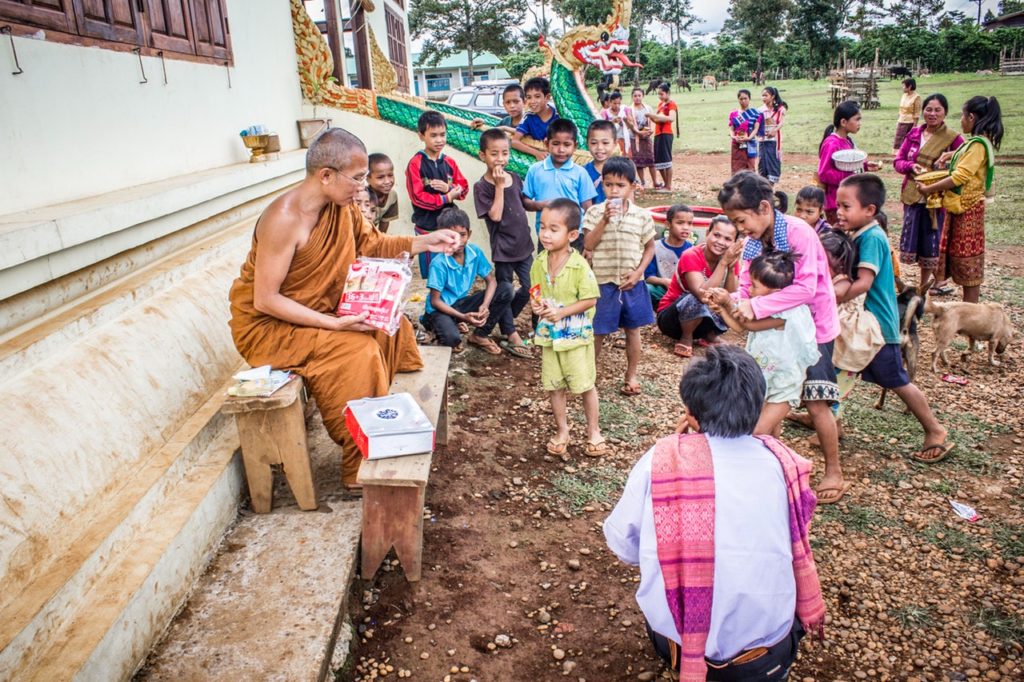5 Simple Practices to Help You Meditate on the Maha-mantra

There’s a Sanskrit word for the daily practices we undertake in order to advance in spiritual life - the word is sadhana. Sadhana is what we do, on a daily basis, to facilitate the purification of our consciousness. It is the regulated part of spiritual life which calls for consistency and discipline.
Yes, discipline. I realize that just a month ago I was urging you to rebel, and now I am calling for discipline. It may seem contradictory, but you’d be wise to note that nothing worthwhile is ever achieved without discipline. Discipline in spiritual life is driven by a desire to become better, and to have an authentic experience of ourselves, free from the limitations that tend to define us.
At the heart of sadhana in bhakti yoga, lies the practice of maha-mantra meditation. All other practices, rituals or routines inherent in sadhana are there to help facilitate good chanting. In essence, sadhana is simply a lifestyle geared towards spiritual advancement.
There are a number of ways in which you can tweak your lifestyle in order to supercharge your meditation practice. In this article I’m going to share with you my personal top 5 practices that have helped me. They are tried and tested, and powerful.
1 Become a Morning Person

Mornings were made for spiritual practice. Any serious spiritual practitioner will attest to this. The earlier, the better. And by earlier I mean before sunrise, or no later than 4 am. Yes, I’ll give you a moment to digest that...
I sulk on the days when I only manage to drag myself out of bed at 6 or 7am, because I know that my chanting will suffer. And if my chanting suffers, my day will suffer. My mind will be more agitated and my day less productive.
Early mornings have a profound effect on us for a number of reasons.
In Vedic philosophy, the dynamic interactions of material energy are said to be ruled by three gunas, or modes of nature - they are tamas (ignorance), rajas (passion) and sattva (goodness). The interplay between these three energies are what determine the predominating mood of a particular time of day.
“Material nature consists of three modes - goodness, passion and ignorance. When the eternal living entity comes in contact with nature, O mighty-armed Arjuna, he becomes conditioned by these modes.” - Krishna to Arjuna in Bhagavad-gita 14.5
Early mornings are bathed in sattva guna - goodness. And because the mind is so strongly influenced by the gunas, the predominance of sattva guna in the morning gives your mind the best possible chance to focus.
During these early morning hours, our brainwaves are in the optimal state for deep focus and concentration. Not only is it a great time for meditation, but also for studying, writing and any creative work. Check out the link at the end of this article to watch a cool video on this topic.
The time just after you rise is where you’ll find the cleanest mental slate you’re going to get, and what you do during this time sets the tone for the rest of your day. In addition, our willpower is strongest in the mornings and decreases as the day goes on. So if you’re struggling to meditate on a daily basis, mornings are your solution.
Of course, in order to rise early, one must also go to bed early. Sattva guna cannot support your meditation if you keep falling asleep! If you’re accustomed to late nights, you’ll probably need to ease your way into a new routine over a few weeks. Try going to bed 30 min earlier than usual so that you can rise 30 min earlier, and continue like that until you reach your target wake-up time.
2 Write About It

Mantra meditation will lead to ‘ah-ha!’ moments, or simply to clarity, or maybe to frustration. In any case, try writing about your experience. If it’s hard, if it’s boring, if it’s magical, if it’s expected or unexpected. Writing has the somewhat magical quality of revealing our realizations to us.
Much has been written about journaling and the benefits to our mental health. It is a powerful tool for self-reflection and building confidence. You’re writing for yourself, so there’s no need to hold back.
Personally, after journaling for some time, I felt inspired to share my realizations with others. There is a strong tradition of writing in the line of bhakti yoga which I practice. I, like many others, am very much indebted to those great saints who had the good sense and compassion to put their spiritual realizations into the written form.
In her bestselling book about awakening creativity (The Artist’s Way), Julia Cameron encourages her readers to start a journaling exercise she calls ‘Morning Pages’. She suggests filling three pages, first thing in the morning, with your hand-written words.
Whether you decide to write before or after, or before and after your mantra meditation, set a goal to write a certain number of pages each day. Even if you feel like you have nothing to write, fill the page. A good place to start is with gratitude:
“Gratitude turns whatever we have into enough. What’s more, gratitude is a practice. The more you practice being grateful for what you have, the more you’ll develop your capacity for appreciation. When you can appreciate all things, even so-called reversals in your life, seeing them as valuable lessons, you’ll be situated in unwavering spiritual satisfaction.” - Vaisesika Dasa, on the importance of keeping a gratitude journal.
When you’re forced to crystalize your feelings into words, they become easier to digest. When we see our struggles and victories on the page in front of us, we can more clearly evaluate our progress, make adjustments and become inspired to continue in our practice. And I promise, you will see progress!
3 Be Selfless

Another integral part of bhakti (devotion) is seva, or selfless service. Service without self-interest is perhaps the purest expression of love we can find in this world. And since the maha-mantra is all about love and devotion, undertaking some selfless service will help you to connect more deeply to the mantra as you chant it.
Seva purifies and softens the heart. It is deeply satisfying and has some desirable side-effects, such as happiness and contentment. So do something for someone else, without being asked and without seeking recognition or compensation. But make sure that it’s something the other person actually wants or needs, and not simply what you think they need.
4 Go For a Walk

Because you know it’s great for you.
Sitting in meditation is a lot easier if your body is well taken care of, and for most people, walking is the simplest and most effective way to do it. Those in the know recommend at least 20 min a day, and who am I to argue? It’s a good place to start.
Just as times of the day are under the influence of the gunas, so are places. Forests and rivers are full of sattva guna - goodness. If you can safely walk in a forest, on a beach or in the mountains, do that. Parks and leafy sidewalks are the next best thing... but walking in a mall doesn’t count! Unlike in malls, walking in nature has the benefit of being very grounding, and natural environments are full of prana - life force! Try going barefoot if you can, at least for a few steps.
Another consideration is that mantra meditation is easily done while walking. Although sitting in one place to meditate is the most effective way to meditate in terms of focusing the mind, a walking meditation can also be very helpful, especially if you often find yourself wanting to fall asleep while meditating.
It can be harder to focus on the mantra while doing a walking meditation, as your senses are more engaged with the world around you. But if it’s a question of falling asleep while sitting, or meditating while walking, choose the latter.
5 Eat Compassionately

This is a hot topic for many people, and it's heating up again in light of the current pandemic crisis. If it’s all the same to you, I’d like to avoid getting into a nitty gritty debate about it right here and now. But a diet based on non-violence and compassion to all living beings is so important in raising consciousness that it would be irresponsible of me not to mention it here.
In my personal experience, the single biggest influence on my consciousness, other than chanting Hare Krishna, was switching to a lacto-vegetarian diet. The effect is profound.
I have no doubt that many of our readers already identify themselves as vegan or vegetarian, but for those of you who don’t, I have one request: Just think about it. Do some research and entertain the notion. If you’re serious about wanting to meditate better, experiment with herbivorous nutrition.
To put it all in context...
At a time when everything is up in the air, my hope for you is that you can grow roots deep into your mantra meditation practice with the help of these five stabilizing adjustments to your lifestyle.
The world today is looking drastically different than it did just a week ago, and no one really knows what it will look like a week from now. Amidst all of this uncertainty, there is peace of mind and fearlessness to be found in the chanting of the maha-mantra. In fact, now its time to shine. Things may seem out of control from our limited perspective, but the universe is dancing to a divinely choreographed tune. Chant the maha-mantra, and you will hear it.
Hare Krishna Hare Krishna Krishna Krishna Hare Hare Hare Rama Hare Rama Rama Rama Hare Hare
Links
Be Inspired - This is Why All Billionaires Wake Up EXACTLY at 4:00 AM